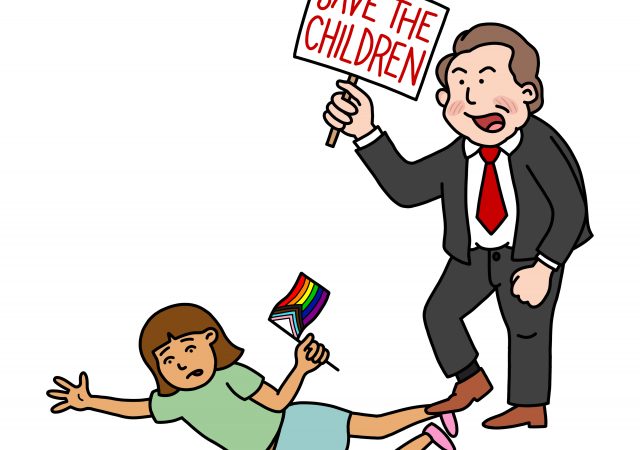
Flower Maiden
Kaden/OutWrite There’s a knock, and the house seems to pause. Three years have passed, three years since you last saw her, but the air still holds the weight of stories and laughter…

Hades and Queer Representation
Charlie Richmond/OutWrite This article contains spoilers for the video game “Hades.” During my brief break…

Misgendering the Misgendered
I first witnessed a transgender character misgendered by her own author in “The Man Who Thought Himself a Woman,” a short story published anonymously in 1857. The text was assigned for a queer short stories course at UCLA, and while I wasn’t surprised that a transgender character was misgendered by a writer in 1857, I was surprised that a professor of queer studies in 2023 would as well.

Performative Pride, Capitalism and Conservative Hate: The Downfall of the Target Pride Collection
“What do you mean they’re out of stock in all sizes? I’m wearing it,” I grumbled from the confines of a Target fitting room. My girlfriend was trying to find me a different size of the bright green Pride jumpsuit that has circulated TikTok, but, as we looked for more of the Pride collection items in different sizes, it became evident that many weren’t available online for pickup, delivery or shipping, despite being available in very small quantities in Westwood’s City Target.
Ronald Reagan and Creating the Conditions for Satanic Panic
The Satanic Panic almost perfectly coincides with former-President Reagan’s term, beginning in 1980 and dying out by the early 1990s while Reagan’s presidency lasted from 1981 to 1989. While Reagan himself did not acknowledge the moral panic, he created the perfect conditions for it and knew how to champion himself as its hero.
Being My Mother’s Son: A Review of Queer Korean Documentary “Coming to You”
On May 5, 2023, UCLA screened “Coming to You” (“한글: 너에게 가는 길”) directed by Gyu-ri Byun (she/her), a groundbreaking Korean documentary about the mothers of queer adults in Korea. The documentary centers on the mothers, Nabi (she/her) and Vivian (she/her), who are members of PFLAG Korea (Parents, Families and Allies of LGBTAIQ+ People in Korea). Both women are cisgender and heterosexual. Prior to their children coming out to them, they held little to no knowledge about the queer community and harbored discriminatory opinions about queerness. Nonetheless, the documentary made no excuses for their past queerphobia and followed their journeys into wholehearted queer activism.
Dodging a Bullet Straight into a Bat: The Dodgers Pride Night Controversy
Throughout May, the Los Angeles Dodgers have invited, disinvited, and re-invited the Sisters of Perpetual Indulgence, a group of queer and trans nuns, to their Pride Night on June 16. Pride Month is only just knocking a jaunty rhythm on our door, but the LGBTQ+ community is already facing exhaustion and backlash for corporations and large organizations attempts at inclusivity.
Think of the (Straight) Children
In 1977, orange juice spokeswoman Anita Bryant campaigned against a new anti-discrimination law protecting gay men and lesbians in Dade County, Florida. She had it overturned and riding on the wave of this success, started Save Our Children, the United States’ first national anti gay group.
The Censure of Trans Lawmaker Zooey Zephyr
Instead of shutting down harmful anti-trans bills, the Montana House of Representatives chose to shut down the voice of trans representative Zooey Zephyr. Zephyr is a member of the Montana House of Representatives and is in the 100th district representing Missoula, one of the bluest areas of Montana.























